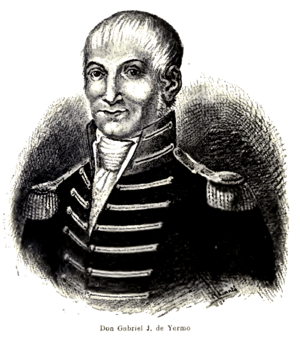Gabriel J. de Yermo facts for kids
Gabriel J. de Yermo (born 1757 in Sodupe, Spain; died 1813 in Mexico City) was a very wealthy landowner in New Spain, which is now Mexico. He was a strong leader for those who wanted New Spain to stay loyal to the King of Spain. He also led a sudden takeover in 1808 that removed the ruler, called the Viceroy, José de Iturrigaray.
Early Life and Wealth
When Gabriel de Yermo moved from Spain to New Spain, he married his cousin, María Josefa de Yermo. She inherited large farms called haciendas in places like Temixco and San Gabriel. These places are in what is now the state of Morelos.
Later, Gabriel de Yermo gained control over the sale of certain goods. He had a monopoly (meaning he was the only one allowed to sell) on a strong alcoholic drink called aguardiente. He also controlled the sale of meat in Mexico City.
In 1790, Yermo celebrated the birth of his first child. To mark this happy event, he freed all of his more than 400 slaves. In 1797, he bought another hacienda called Jalmolonga. This farm used to belong to the Jesuits, a religious group. Yermo freed the slaves who worked there too.
In 1808, he freed 200 more slaves from his Temixco hacienda. This was to celebrate his wife's saint day. Because of these actions, many of his former slaves did not join the fight for independence. Instead, they stayed loyal to the King of Spain. They were called royalists. They even helped Yermo remove Viceroy Iturrigaray. They remained loyal to Spain into the 1820s.
Growing Unrest in New Spain
On July 14, 1808, news arrived in Mexico that the Spanish king, Ferdinand VII, had given up his throne to Napoleon. This news caused a lot of anger among the Criollos. Criollos were people of Spanish descent who were born in New Spain.
On July 19, 1808, two members of the Mexico City Cabildo (city council), Juan Francisco Azcárate y Ledesma and Francisco Primo de Verdad y Ramos, suggested a plan. They wanted to form a junta. A junta was a temporary, self-governing group for New Spain. They wanted Viceroy Iturrigaray to lead it. The viceroy and the Cabildo agreed to this plan.
However, the Audiencia (a high court) did not agree. This plan was also strongly opposed by the Peninsulares. Peninsulares were Spaniards who were born in Spain but lived in New Spain.
On September 1, 1808, a priest named Melchor de Talamantes supported the Criollos. He argued that New Spain should separate from Spain. He believed that since the King was gone, the people should now have the power. He thought a Mexican congress should be formed. It seemed like a fight might break out between the Peninsulares and the Criollos.
The Coup Against the Viceroy
Viceroy Iturrigaray seemed to support the idea of independence. Because of this, the Spanish party did not trust him. They chose Gabriel de Yermo to be their leader.
Iturrigaray was about to resign when, on September 15, 1808, Yermo and his supporters arrested him. Yermo had the support of rich Spanish merchants, judges, the archbishop, and the Inquisition. About 500 armed people attacked the viceroy's palace at 2 in the morning. One soldier was killed. The members of the Cabildo were also arrested.
After the takeover, Marshall Pedro de Garibay was made the new viceroy. He was controlled by the Spanish party. King Fernando VII later made Yermo a marquis, which is a noble title. Gabriel de Yermo died in 1813, during the Mexican War of Independence.
See also
 In Spanish: Gabriel de Yermo para niños
In Spanish: Gabriel de Yermo para niños
 | Bayard Rustin |
 | Jeannette Carter |
 | Jeremiah A. Brown |


